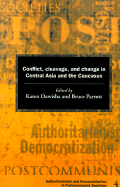Book contents
- Frontmatter
- Contents
- List of tables
- List of contributors
- Preface
- 1 Perspectives on postcommunist democratization
- 2 Democratization and political participation: research concepts and methodologies
- The Caucasus
- Central Asia
- 6 Democratization and the growth of political participation in Kazakstan
- 7 Kyrgyzstan: the fate of political liberalization
- 8 Thwarted democratization in Tajikistan
- 9 Turkmenistan: the quest for stability and control
- 10 Political development in Uzbekistan: democratization?
- Appendix
- Index
7 - Kyrgyzstan: the fate of political liberalization
Published online by Cambridge University Press: 01 June 2011
- Frontmatter
- Contents
- List of tables
- List of contributors
- Preface
- 1 Perspectives on postcommunist democratization
- 2 Democratization and political participation: research concepts and methodologies
- The Caucasus
- Central Asia
- 6 Democratization and the growth of political participation in Kazakstan
- 7 Kyrgyzstan: the fate of political liberalization
- 8 Thwarted democratization in Tajikistan
- 9 Turkmenistan: the quest for stability and control
- 10 Political development in Uzbekistan: democratization?
- Appendix
- Index
Summary
During its first two years of independence, Kyrgyzstan enjoyed a reputation as an oasis of democracy in the harsh political landscape of Central Asia. Under the leadership of Askar Akaev, a progressive scientist whose sources of support lay outside the Communist Party apparatus, the country began to aggressively dismantle the political and economic pillars of Soviet rule. Although political power remained highly concentrated, the state laid the foundations for a civil society by promoting a free press, private political associations, and a market economy. Akaev's reforms quickly attracted the attention and largesse of Western donors, who by the end of 1993 had pledged almost half a billion dollars to assist Kyrgyzstan in its transition toward democracy.
The Kyrgyz political miracle began to fade, however, in the mid-1990s. Faced with an economic crisis, an inefficient and corrupt state bureaucracy, and deep divisions within the country's elites and masses, the political leadership experimented with anti-democratic measures to shore up its authority. In the summer of 1994, President Akaev closed down two opposition-minded newspapers, launched a referendum to create new political institutions – in violation of the existing constitution – and conspired in a successful attempt to shut down parliament several months before its term had expired. In the parliamentary elections that followed in February 1995, fraud, corruption, and public anomie reigned. New criminal elements allied with segments of the old nomenklatura to return a legislature that promised little support for the reformist agenda advanced by the president.
- Type
- Chapter
- Information
- Conflict, Cleavage, and Change in Central Asia and the Caucasus , pp. 242 - 276Publisher: Cambridge University PressPrint publication year: 1997
- 12
- Cited by



